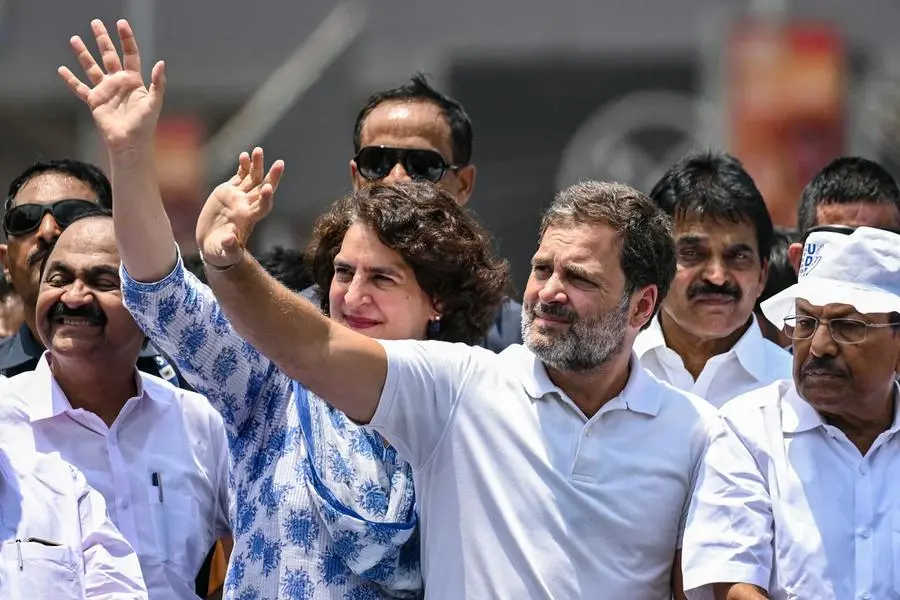PHOTO
The son, grandson and great-grandson of former prime ministers, Rahul Gandhi was India's next leader in waiting when he made his first foray into politics in 2004.
But two decades on, as India readies to launch marathon general elections this month, the 53-year-old opposition Congress party leader has failed dismally to live up to his family legacy.
The once-dominant Congress has withered under his stewardship, and he has already suffered two landslide election defeats against Modi.
He has also been hamstrung by several criminal cases lodged against him by members of Modi's ruling Bharatiya Janata Party (BJP), including a defamation conviction that saw him briefly disqualified from parliament last year.
The prospects of a turnaround anytime soon, analysts believe, are bleak.
Rahul has struggled to shed his image of an entitled princeling, while his often lacklustre oratory skills are overshadowed by the populist appeal of his politically battle-hardened rival Modi.
"Young India does not want a fifth-generation dynast," historian Ramachandra Guha, an ardent critic of Modi, said of Rahul after his party was drubbed in 2019 elections.
Last year, Rahul sought to change his public reputation, presenting what he said was his real self by embarking on a cross-country trek to hear the concerns of ordinary voters.
Rahul, a bachelor, argued India's media had expended time and money in portraying him in a manner "which is just untruthful and wrong" and insisting that his "truth is different."
But while his journey captured some initial attention, it rapidly fizzled out.
"People still find Modi more credible," Rahul Verma, of the Centre for Policy Research think-tank in New Delhi, told AFP last month.
- Cambridge to Delhi -
No relation to independence hero Mahatma Gandhi, Rahul was born in 1970 when his grandmother Indira Gandhi -- daughter of India's first prime minister, Jawaharlal Nehru -- was prime minister.
In 1991, when he was 20, his father Rajiv Gandhi was assassinated by a Tamil suicide bomber, seven years after Indira was shot dead by her bodyguards.
Rahul, who was then at Harvard University, dropped out. He later graduated from Rollins College in Florida, before going on to earn a master's degree from Cambridge.
After a stint as a management consultant in London, he returned to India to join the Congress party -- then helmed by his Italian-born mother Sonia -- and was subsequently elected to parliament.
Despite once comparing power to poison, Rahul formally took over the reins of the party from his mother in 2017.
But he has had little to show by way of achievement.
Regularly fumbling while delivering speeches in Hindi, Rahul was dubbed "pappu", or witless, by Modi.
The Congress party, which dominated politics for decades after independence, was repeatedly humbled.
In the 2019 general elections, Rahul lost his formerly safe seat of Amethi in Uttar Pradesh to rising BJP star Smriti Irani.
He blamed the defeat on Modi's BJP using "the entire machinery of the Indian state" against the opposition.
- 'No money' -
Rahul and the Congress party are part of an opposition coalition of two dozen parties seeking to oust the BJP in six-week elections beginning April 19.
But analysts say Rahul's job is unenviable: Modi's government has been widely accused of tipping the scales in his favour.
Rahul was convicted of criminal libel last year and briefly disqualified from parliament after a complaint by a member of Modi's party.
His two-year prison sentence was suspended by a higher court but Rahul faces several other defamation cases.
Congress's bank accounts were frozen by the tax department this year, with Rahul telling reporters last month the elections were "not a level playing ground" and that India was no longer a functional democracy.
"We have no money to campaign, we cannot support our candidates," he said.
"Our ability to fight elections has been damaged."





















